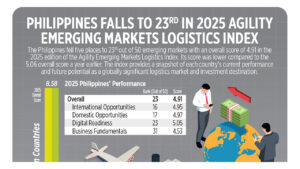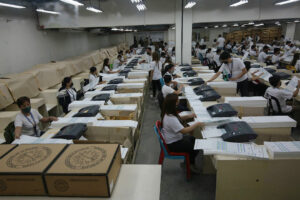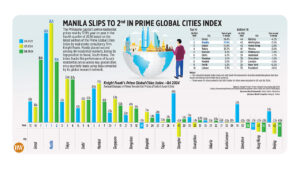Filipino BPO workers at risk of being displaced by AI — report

By Luisa Maria Jacinta C. Jocson, Reporter
SOME SECTORS in the Philippine labor market, such as the business process outsourcing (BPO) industry, could be at risk of being displaced by artificial intelligence (AI), the International Monetary Fund (IMF) said.
“As AI systems become more capable and readily available, they are likely to replace or significantly alter many job roles, particularly those involving routine and repetitive tasks,” it said in a working paper.
“The Philippines, with its large BPO sector, faces unique challenges and opportunities. The BPO industry, a significant contributor to the country’s economy, might experience shifts as AI-driven chatbots and virtual assistants handle more customer service tasks.”
The paper said that around one-third of jobs in the Philippines are highly exposed to AI, which means that AI can perform many of the tasks in these occupations.
The IMF found that 61% of the highly exposed jobs are also considered highly complementary.
This means AI technologies are “likely to support rather than replace the worker, potentially increasing their productivity.”
“The remainder (14% of the total workforce) hold jobs with low complementarity, making them susceptible to displacement by AI,” it added.
Jobs with high exposure to AI and high complementarity include general and operations managers, first-line supervisors, teachers and teaching assistants, lawyers, civil engineers and counselors.
Meanwhile, those jobs with high exposure but low complementarity includes customer service representatives, telemarketers, accountants, auditors, secretaries and administrative clerks.
Though it accounts for just about 3% of the workforce, the IMF said BPO workers are considered highly exposed with low complementarity.
The IMF noted the Philippines’ BPO sector is a key growth engine for the country.
“The BPO industry, which predominantly focuses on routine-centric tasks and low-skilled roles such as answering phone calls and dealing with inquiries, may be adversely affected by AI,” it said.
The IMF cited data showing the Philippines’ share of the global outsourcing market is at 15%.
“The BPO sector’s significant contribution to the economy — accounting for 7.4% of GDP in 2023, similar in magnitude to remittances — means that changes within this industry are macro-critical and may have spillover effects on the broader economy.”
Data from the International Labor Organization showed 89% of the BPO workforce face a high risk of automation.
“Before, the threat of automation was contained to low-skilled, blue-collar jobs,” the IMF said.
“However, generative AI’s capabilities now pose a threat to white-collar jobs, especially for information technology and business process management (IT-BPM) workers as customer services agents, tech support, and non-university educated employees.”
Meanwhile, it also found that the most exposed workers to AI are “college-educated, young, urban, female, and well-paid workers in the service sector.”
“It will be critical for young workers to have the skills that allow them to employ AI to increase their productivity for the Philippines to capitalize on the impending demographic dividend,” it added.
The IMF said that AI preparedness will also impact the adoption of these emerging technologies.
“Despite these efforts, challenges persist, including regulatory gaps, inadequate infrastructure, workforce reskilling needs, and limited AI adoption due to cost concerns… Addressing these issues is crucial for the Philippines to fully leverage AI’s economic and societal benefits,” the IMF said.
In 2024, the Philippines ranked 56th out of 188 countries on the Government AI Readiness Index.
When harnessed correctly, the IMF said that AI can be used to “create new opportunities, fostering growth in tech-driven industries and necessitating a workforce with advanced digital skills.”
The National Economic and Development Authority (NEDA) earlier said the economy could gain P2.6 trillion annually if domestic businesses adopt AI solutions.
The government must strategize how to minimize job displacement and maximize benefits such as increased productivity and job creation, the IMF said.
“Investments in education and training programs focused on AI and digital skills are essential to prepare the workforce for the future.”
“Furthermore, developing a regulatory framework that ensures the ethical use of AI and addresses issues related to labor market transitions is imperative, drawing on lessons from global best practices,” it added.
Analysts said the government must be proactive in the AI transition.
University of the Philippines Diliman School of Labor and Industrial Relations Assistant Professor Benjamin B. Velasco said that AI can be used to generate more jobs.
“AI will replace some forms of work, but it can also create other kinds of jobs. Upskilling is one way to deal with the ‘creative destruction’ effect of AI,” he said.
“Understandably, the government and businesses are trying to find some niche in which there are upskilled jobs that complement AI and take advantage of AI. For example, if you do not want to be replaced by AI, learn to program AI or train AI.”
Federation of Free Workers President Jose Sonny G. Matula said AI training must be aligned with development objectives.
“AI should be developed to help realize agro-industrial development, to mechanize and digitalize farms for greater productivity and contribute to national food security,” he said.
Mr. Matula also expressed concern over the widening skills and wage gap.
“Promote fair wages and equitable distribution of productivity gains from AI. This will happen if there is free, independent collective bargaining between employers and workers, through their unions,” he said.
Mr. Matula also called for expanding vocational training and lifelong learning programs focused on AI-adjacent skills.
“While AI is unlikely to replace all human jobs, its impact on the workforce must be managed carefully. The key is to ensure that AI serves as a tool to enhance human labor, not as a means to displace workers without recourse,” he added.




